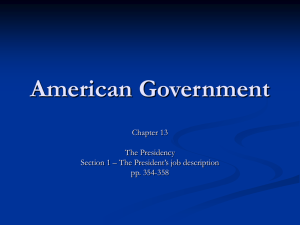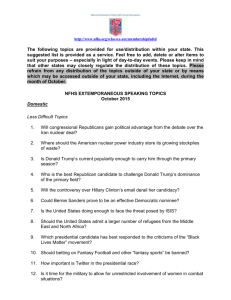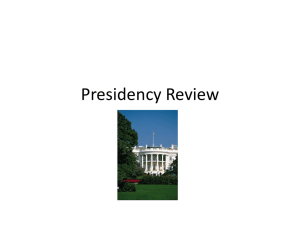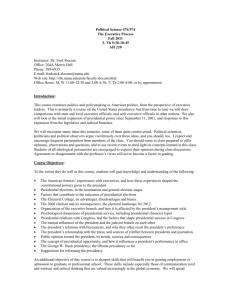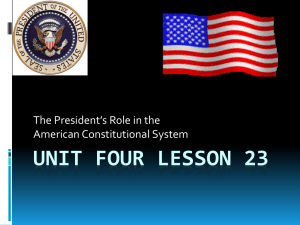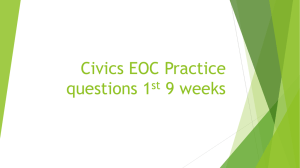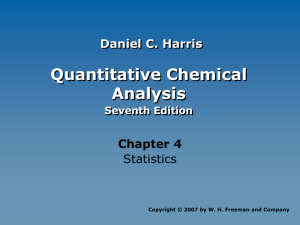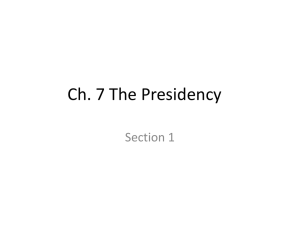Syllabus - Political Science
advertisement
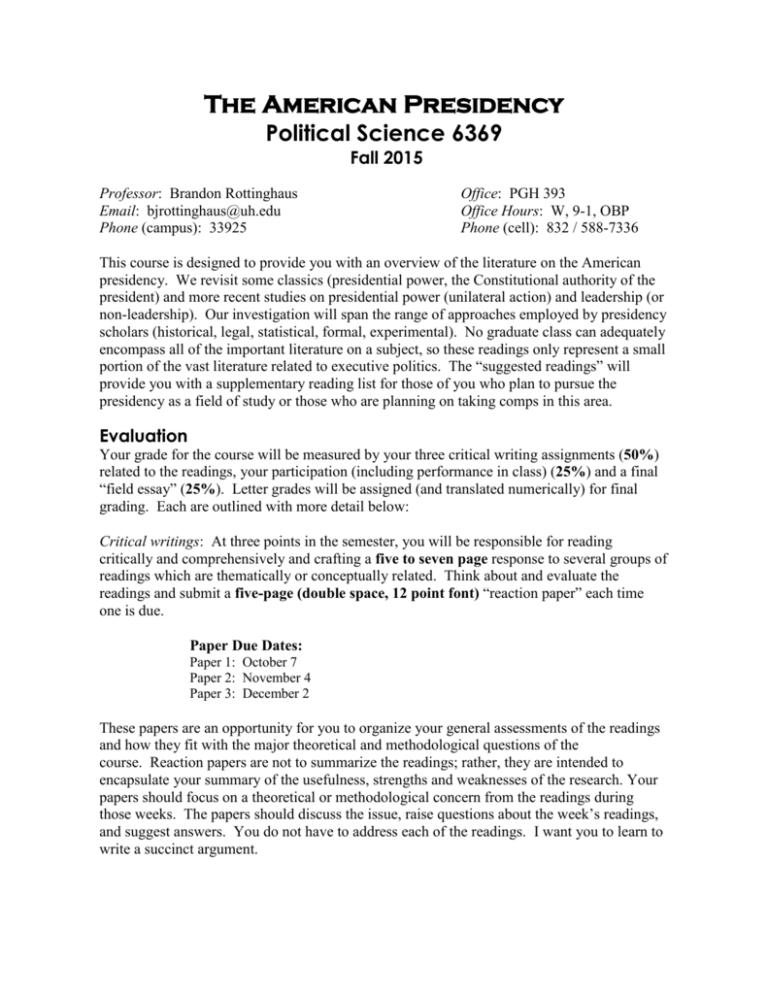
The American Presidency Political Science 6369 Fall 2015 Professor: Brandon Rottinghaus Email: bjrottinghaus@uh.edu Phone (campus): 33925 Office: PGH 393 Office Hours: W, 9-1, OBP Phone (cell): 832 / 588-7336 This course is designed to provide you with an overview of the literature on the American presidency. We revisit some classics (presidential power, the Constitutional authority of the president) and more recent studies on presidential power (unilateral action) and leadership (or non-leadership). Our investigation will span the range of approaches employed by presidency scholars (historical, legal, statistical, formal, experimental). No graduate class can adequately encompass all of the important literature on a subject, so these readings only represent a small portion of the vast literature related to executive politics. The “suggested readings” will provide you with a supplementary reading list for those of you who plan to pursue the presidency as a field of study or those who are planning on taking comps in this area. Evaluation Your grade for the course will be measured by your three critical writing assignments (50%) related to the readings, your participation (including performance in class) (25%) and a final “field essay” (25%). Letter grades will be assigned (and translated numerically) for final grading. Each are outlined with more detail below: Critical writings: At three points in the semester, you will be responsible for reading critically and comprehensively and crafting a five to seven page response to several groups of readings which are thematically or conceptually related. Think about and evaluate the readings and submit a five-page (double space, 12 point font) “reaction paper” each time one is due. Paper Due Dates: Paper 1: October 7 Paper 2: November 4 Paper 3: December 2 These papers are an opportunity for you to organize your general assessments of the readings and how they fit with the major theoretical and methodological questions of the course. Reaction papers are not to summarize the readings; rather, they are intended to encapsulate your summary of the usefulness, strengths and weaknesses of the research. Your papers should focus on a theoretical or methodological concern from the readings during those weeks. The papers should discuss the issue, raise questions about the week’s readings, and suggest answers. You do not have to address each of the readings. I want you to learn to write a succinct argument. Tips to get started: Pick up one or two themes or arguments from the readings and really analyze them. Evaluate the readings rather than editorializing. Think about the work in relation to other theories or empirical findings we’ve read. Connect the work’s methodology to other methodologies. Think about what “conventional wisdom” holds – does the work contradict this? Some questions to consider: Did the authors say all there was to say? What did they miss? What should they have included? Can you suggest counter factuals? What are the implications for studying the concept or issue the way they did? Did they measure their variables correctly or sufficiently? What limits are inherent in how the variables are measured or how the study is designed? How might it change if we change the approach or choose different data? Does what they are talking about jell with the “real world”? Are the conclusions generalizable? Questions along these analytical and deconstructive lines are what I am looking for in your papers rather than a summary of what you thought about the readings. Ultimately, these short papers should give you a sense of what kinds of questions to ask in general and specifically a theoretical way to begin your final project for this class your MA thesis or dissertation. I don't require you to do outside research or offer additional citations (although some in the past have incorporated readings from other classes and it made their papers better). Ideally, you will use the readings to critique each other -- the readings are usually diverse enough that they take different approaches to similar theoretical questions (or frequently come up with divergent conclusions), so feel free to play one off of another in a comparative sense. Participation: Your weekly in-class discussion participation is critical to my ability to track your progress and your own development in understanding the material. This requires you to have a comprehensive understanding of the readings and (obviously) to come to class. You should be prepared to answer the following questions for each reading each class: (1) (2) (3) (4) What is the main contribution of the reading to scholarly knowledge? What theoretical tradition is the reading working within or in contrast to? What hypotheses are offered for empirical evidence? What are the data and measures used in the paper appropriate for evaluating the theory and hypothesis? (5) What are the main findings? (6) What are the implications of the theory and results for understanding political behavior? (7) What are your criticisms of the research? Field essay: Due Monday of finals week (12/14/15). Each student will turn in a 10-15 page “field” essay during finals week. For this assignment, you should (a) pick a particular research area in the presidency field that interests you, (b) identify the principal research questions within this field, (c) discuss the major findings to date, noting any ambiguities or significant disagreements among authors, and (d) highlight possible paths for future research. The following are good examples of field essays: Norrander, Barbara. 1996. “Presidential Nomination Politics in the Post-Reform Era,” Political Research Quarterly 49:4, 875-915. Leighley, Jan E. 1995. “Attitudes, Opportunities and Incentives: A Field Essay on Political Participation,” Political Research Quarterly 48:1, 181-210. Gronke, Paul and Brian Newman. 2003. “FDR to Clinton, Mueller to ?: A Field Essay on Presidential Approval.” Political Research Quarterly 56: 4, 501-12. These are longer in text and larger in scope than the one required here, but these give you a sense of how to craft a summary and synthesis of a large body of literature. One strategy in preparing for this project is to identify a smaller portion of a subfield’s literature (perhaps structured around a question) and write a more narrowly focused field essay. Use the “recommended” readings below to begin this process and please discuss it with me. An alternative to this is to write a more involved paper that is conference (or journal) quality. This paper can be more developed on a specific topic, including data and analysis. If you are interested in this option, it is probably best to discuss this with me. Cheating and Plagiarism: All students are expected to observe the University of Houston’s rules against cheating and plagiarism. See the section on “Academic Honesty” in the University of Houston Studies handbook for a full statement regarding UH’s rules against cheating and plagiarism. A succinct discussion of the University’s policies with links to all the relevant regulations can be found at http://www.uh.edu/provost/stu/stu_syllabsuppl.html. Any violation may result in expulsion from the University. Cheating and plagiarism in this class will be punished to the maximum extent possible. ADA Statement: The American with Disabilities Act (ADA) is a federal antidiscrimination statute that provides comprehensive civil rights protection for persons with disabilities. Among other things, this legislation requires that all students with disabilities be guaranteed a learning environment that provides for reasonable accommodation of their disabilities. If you believe you have a disability requiring an accommodation, please contact UH’s Center for Students with Disabilities (CSD) at (713) 743-5400. Readings The following books are required for the class and buying them online is probably the easiest way to find them cheaply. I ordered these from the bookstore because I think these are books you will certainly want to keep in your collection. We will read portions of other books not on this list (see below) but buying them is not required (but highly recommended). On Deaf Ears. 2006. Edwards, George. Yale University Press. The Myth of Presidential Representation. 2009. Wood, B. Dan. Cambridge University. Going Local. 2010. Jeffrey Cohen. Cambridge University Press. The Politics Presidents Make. 1997. Skowronek, Stephen. Harvard University Press. Power Without Persuasion. 2003. Howell, William. Princeton University Press. The Wartime President. 2013. Howell, Jackman and Rogowski. University of Chicago Press. In addition, readings marked with a (BR) denote articles I will distribute to you either via email or my website. All others not in our book list above or marked with a (BR) can be found in JSTOR or in the library’s database. * Another excellent resource (which is far too long to be assigned) is The Oxford Handbook of the American Presidency, edited by George Edwards and William Howell. This text has essays on the “state of the field” across the presidency subfield. Schedule: Week 1 (August 26) – Syllabus, Class introductions Week 2 (September 2) – What We Want to Know About the Presidency Oxford Handbook of American Presidency (BR): Howell, “Quantitative Approaches to Studying the Presidency” Skowronek, “The Paradigm of Development in Presidential History” “What we want to know about the Presidency” (PSQ Special Issue, December 2002) : Jones, “Knowing What we Want to Know About the Presidency” Bechsloss, “Knowing What Really Happened” Fisher, “A Dose of Law and Realism for Presidential Studies” Neustadt, “Presidential Power and the Research Agenda” Cameron, “Studying the Polarized Presidency” Week 3 (September 9) – Constitutional Theories of Presidential Behavior Bessette and Tulis, 1981. “The Constitution, Politics and the Presidency” (BR) Corwin, 1984. The President: Office and Powers 1787-1984 (BR) Federalist Papers (68-73) (BR or online) Tulis, Jeffrey, 1990. “The Two Constitutional Presidencies” (BR) Recommended: Tulis, Jeffrey, 1987. The Rhetorical Presidency. Bessette and Tulis, 1981. The Presidency in the Constitutional Order. LSU Pious, 1979, The American Presidency Fisher, 1991, Constitutional Conflicts Between the President and Congress (or other Fisher work) Ellis, Richard, 1999, Founding the American Presidency Week 4 (September 16) – Presidency as an Institution Moe, Terry. 1985. “The Politicized Presidency.” In The New Direction in American Politics, ed. John E. Chubb and Paul E. Peterson. Brookings Press. (BR) Lewis and Howell, 2002. “Agencies by Presidential Design” JOP Lewis, “Staffing Alone: Unilateral Action and the Politicization of the Executive Office of the President, 1988-2004” Presidential Studies Quarterly Excerpts from Rudalevige, Managing the President’s Program (BR) Dickenson and Lebo, 2007. “Reexamining the Growth of the Institutional Presidency, 1940-2000” JOP Recommended: Lewis, David. 2008. The Politics of Presidential Appointments (Princeton) Hess, Stephen. 2002. Organizing the Presidency (Brookings) Burke, John. 2000. The Institutional Presidency (Johns Hopkins) Waterman, Richard. 1989. Presidential Influence and the Administrative State (Tennessee) Lewis, David. 2003. Presidents and the Politics of Agency Design (Stanford) T. Moe, “The Politics of Bureaucratic Structure,” in J. Chubb & P.Peterson (eds.), Can the Government Govern? Week 5 (September 23) – Presidential Power Neustadt, 1990. Presidential Power (BR) Sperlich, 1969. “Bargaining and Overload: An Essay on Presidential Power” (BR) Jacobs and Shapiro,2000. “Conclusion” to Presidential Power edited volume (Columbia) (BR) Dickinson, 2009. “We All Want a Revolution” Presidential Studies Quarterly Rockman, 2009. “Does The Revolution in Presidential Studies Mean “Off with the President’s Head?” Presidential Studies Quarterly Recommended: Neustadt, 2002, “Presidential Power and the Research Agenda” Presidential Studies Quarterly Burns, 1978. Leadership. Perennial. Week 6 (September 30) – “Going Public” Kernell, 2007. Going Public (BR) Jacobs, “The Public Presidency and Disciplinary Presumptions,” Presidential Studies Quarterly Cohen, 2010. The Presidency in the Era of 24 Hour News (BR) Eshbaugh-Soha and Peake, 2012. Breaking Through the Noise (BR) Recommended: Eshbaugh-Soha 2006, The President’s Speeches. Lynne Reinner. McCarty, Nolan, Timothy Groseclose. 2000. “The Politics of Blame: Bargaining before an Audience.” AJPS Tulis, Jeffrey, 1987. The Rhetorical Presidency. Princeton. Laracy, Mel, 2002, Presidents and the People: The Partisan Story of Going Public. Texas A&M. Medhurst, Martin (editor), 1996. Beyond the Rhetorical Presidency. Texas A&M. Dorsey, Leroy (editor), 2002. The Presidency and Rhetorical Leadership. Texas A&M. Week 7 (October 7) – Presidential Leadership in Historical Terms Skowronek, 1991. The Politics Presidents Make (all) Crockett, 2011. “Candidate Obama and the Dilemmas of Political Time,” The Forum (BR) Recommended: Skowronek, 2002, “Presidency and American Political Development: A Third Look” Presidential Studies Quarterly Lowi, Theodore, 1985, The Personal President, Cornell. Crockett, David, 2002, The Opposition Presidency: Leadership and the Constraints of History. Texas A&M Sloan, John, 2008, Title of His Book. Kansas Week 8 (October 14) – Presidential Leadership and Agenda Setting Edwards, 2003. On Deaf Ears: The Limits of the Bully Pulpit (all) Brace and Hinckely, 1993. “Presidential Activities from Truman Through Reagan” JOP Edwards and Wood, 1999. “Who Influences Whom?,” APSR Recommended Readings: Ostrom, Charles W., and Dennis M. Simon. 1988. “The President's Public.” AJPS Eisinger, Robert, 2003. The Evolution of Presidential Polling. Cambridge. Brace, Paul and Barbara Hinckley, 1993. Follow the Leader. Basic Books. Wood, “How Does Presidential Rhetoric on the Economy Affect Presidential Approval” (2005) Canes-Wrone, Brandice, Michael C. Herron and Kenneth W. Shotts. 2001. “Leadership and Pandering: A Theory of Executive Policymaking” AJPS 45(3) Jacobs and Shapiro, 1994, “Issues, Candidate Image and Priming” APSR 88 Hard, Roderick, 1987, The Sound of Leadership. Chicago. Geer, John, 1993. From Tea Leaves to Opinion Polls. Columbia. Week 9 (October 21) – Presidential Leadership II Cohen, 2010. Going Local (all) Eshbaugh-Soha, 2008. “The Impact of Presidential Speeches on the Bureaucracy” Social Science Quarterly Rottinghaus, 2009. “Determining Successful Leadership Strategies” Political Communication (BR) Week 10 (October 28) – Presidential Responsiveness Wood, 2011. The Myth of Presidential Representation (all) Rottinghaus, 2006. “Rethinking Presidential Responsiveness,” JOP Jacobs and Druckman, 2015. Who Governs? Selected chapters (BR) Recommended Readings: Cohen, Jeffrey, 1997. Presidential Responsiveness to Public Policy-Making. Michigan. Towle, Michael, 2004. Out of Touch. Texas A&M. Canes-Wrone, Brandice, 2006. Who Leads Whom? Presidents, Policy and the Public. Chicago. Week 11 (November 4) – Presidential Approval, Elections and Mandates Kernell, 1978. “Explaining Presidential Popularity” APSR Ostrom and Simon, 1985. “Promise and Performance: A Dynamic Model of Presidential Popularity”, APSR Newman, 2003. “Integrity and Presidential Approval, 1980-2000” Public Opinion Quarterly Waterman, Silva and Jenkins-Smith, The Presidential Expectations Gap (BR) Cohen and Powell, 2005. “Building Public Support from the Grassroots Up” Presidential Studies Quarterly Dahl, 1990. “Myth of the Presidential Mandate,” Political Science Quarterly Conley, excerpts from Presidential Mandates (BR) Recommended: Brody, 1991. Assessing the President: The Media, Elite Opinion and Public Support. Stanford. Edwards, 1983. The Public Presidency. St. Martin’s Press. Hibbs, 1982, “The Dynamics of Political Support for American Presidents Among Occupational and Partisan Groups,” AJPS 26 Recommended: Aldrich, John, 1980. Before the Convention: Strategies and Choices in Presidential Nominations. Chicago. Bartels, Larry, 1988. Presidential Primaries and the Dynamics of Public Choice. Princeton. Brady, David, 1988. Critical Elections and Congressional Policy-Making. Stanford. Week 12 (November 11) - Congress and the Presidency Excerpts from Jones, 1990. The Presidency in a Separated System, Chapter 1 (BR) Jeffrey E. Cohen. 2012. The President’s Legislatie Policy Agenda (all) Bond and Fleisher, 1990. The President in the Legislative Arena, selected chapters (BR) Beckmann, 2012. Pushing the Agenda, Chapter 4 (BR) Krehbeil, 1993. Pivotal Politics, Chapters 1 and 2 (BR) Sullivan, Terry, 1990. “Bargaining with the President: A Simple Game and New Evidence,” APSR Canes-Wrone, 2001. “The President's Legislative Influence from Public Appeals,” AJPS Recommended: Beckmann, 2010, Pushing the Agenda. Cambridge. Jones, 1994. The Presidency in a Separated System. Brookings Press. Cameron, Charles. 2000. Veto Bargaining: Presidents and the Politics of Negative Power. Cambridge U. Press. Covington, et. al., “A “Presidency-Augmented” Model of Presidential Success on House Roll Call Votes.” AJPS (1995). Peterson 1990, Legislating Together. Harvard. Eshbaugh-Soha 2006, The President’s Speeches. Lynne Reinner. Thurber (editor) 2005, Rivals for Power. CQ Press. Rhode and Simon, “Presidential Vetoes and Congressional Response,” AJPS (1985) Edwards, 1989. At the Margins. Yale. Fiorina, 2002. Divided Government. Longman. Matthews, Stephne, 1989, “Veto Threats: Rhetoric in ad Bargaining Game” Quarterly Journal of Economics 104 Peterson, Mark, 1990. Legislating Together. Harvard. Week 13 (November 18) – Foreign Policy Howell, Jackman and Rogowski, The Wartime President (all) Wildavsky, “The Two Presidencies,” Trans-Action 4 (BR) Peppers, 1972. “’The Two Presidencies’ Eight Years Later” (BR) Meernik, 1994. “Presidential Decision Making and the Political Use of Military Force” JOP Kam and Ramos, 2008. “Joining and Leaving the Rally” POQ Newman and Forcehimes, 2010. “Rally Round the Flag Events for Presidential Approval Research” Electoral Studies Wood, 2009. “Presidential Saber Rattling and Presidential Approval” AJPS Recommended: Allison, Graham, 1971. Essence of Decision: Explaining the Cuban Missile Crisis. Longman. Krasner, Steven, 1972, “Are Bureaucracies Important? (Or Allison Wonderland)” Foreign Policy 7 Burke, John and Fred Greenstein, 1989. How Presidents Test Reality. Russell Sage. Mueller, John, 1973. War, Presidents and Public Opinion. University Press. Muller, John, 1994. Policy and Opinion in the Gulf War. Chicago. Schlesinger, Arthur, 1989. The Imperial Presidency. Mariner. Week 14 (November 25) – No Class, Thanksgiving! Week 15 (December 2) – Unilateral Presidency Howell, 2003. Power Without Persuasion (all) Bailey and Rottinghaus, APR, “Presidential Power and the Source of Authority” (BR) Belco and Rottinghaus, PRQ, “Delegation of Discretion and the Power to Act Alone” (BR) Belco and Rottinghaus, Unilateral Power in a Shared Power Context (Forthcoming) (BR) Recommended: Mayer, Ken, 1999. “Executive Orders and Presidential Power” JOP 61 (2) Rudaveledge, Andrew. 2005 . The New Imperial Presidency. Harvard. Mayer, Ken, 2001. With the Stroke of a Pen. Princeton. Cooper, Phillip, 2002, By Order of the President: The Use and Abuse of Executive Direct Action Deering and Maltzman, 1999. “The Politics of Executive Orders.” PRQ Cooer, Phillip, 2005. “George W. Bush, Edgar Allan Poe, and the use and abuse of presidential signing statements.” Presidential Studies Quarterly 35 (3): 515-32. Howell, William D., and Jon Pevehouse. 2005. “Presidents, Congress and the use of force.” International Organization 59 (1): 209-32. Krause, George A., and Jeffrey E. Cohen. 2000. “Opportunity, Constraints and the Development of the Institutional Presidency: The issuance of executive orders, 1939-1996.” Journal of Politics 62 (1): 88-114. Mayer, Kenneth R., and Kevin Price. 2002. “Unilateral Presidential Powers: Significant Executive Orders, 194999.” Presidential Studies Quarterly 32 (2): 367-86. Marshall, Bryan W., and Richard L. Pacelle Jr. 2005. “Revisiting the two presidencies: The Strategic use of Executive Orders.” American Politics Research 33 (1): 81-105. Moe, Terry M., and William Howell. 1999. “Unilateral Action and Presidential Power: A Theory.” Presidential Studies Quarterly 29 (4): 850-73. *********************************************** Additional Readings for: Bureaucracy and Policymaking Peterson, Mark, 1992. “The Presidency and Organized Interests” APSR 86 (3) Burke, John. The Institutional Presidency, Chapters 3 and 4 Light, Paul, 1999. The President’s Agenda, Chapters 1 and 11 Recommended: Burke, John, 1992. The Institutional Presidency. Johns Hopkins. Arnold, Peri, 1986. Making the Managerial Presidency. Kansas. Benze, James, 1987. Presidential Power and Management Techniques. Greenwood. Hult and Walcott, 1995. Governing the White House. Kansas. Moe, Terry, 1998. “The Presidency and the Bureaucracy: The Presidential Advantage” Kingdon, John, 1984. Agendas, Alternatives and Public Policy. Longman. Nathan, Richard, 1983. The Administrative Presidency. Wiley. Psychological Theories of Presidential Behavior Barber, The Presidential Character (read all but skim 5, 6 ,8 and 11) Stanely, The Clinton Presidency (Chapter 4) (BR) Recommended: Alexander George, 1974. “Assessing Presidential Character,” World Politics 26 Greenstein, Fred, 1988. The Hidden-Hand Presidency. Princeton. George and George, 1998. Presidential Personality and Performance. Westview. Hargrove, Erwin, 1966. Presidential Leadership, Personality and Political Style. MacMillian. Renshon, Stanely, 1996. High Hopes: The Clinton Presidency and the Politics of Ambition. Routledge. Pfiffner, James, 2004. The Character Factor. Texas A&M. Comparative Executive Politics Rockman, Bert. 1998. “The American Presidency in Comparative Perspective: Systems, Situations and Leaders.” In The Presidency and the Political System (ed. Michael Nelson). Shugart, M. and Steino. 1992. Presidents and Assemblies.
